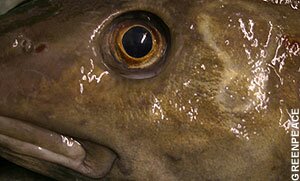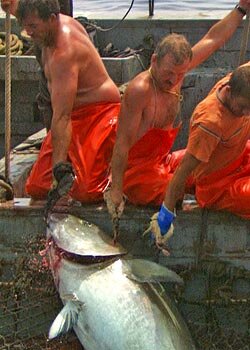Tag Archive for 'illegal fishing'
We have a great news clip from Al Jazeera discussing the outcome of CITES with a big focus on bluefin tuna. Our very own Charles Clover joins the debate discussing the disappointing outcome from this year’s meeting and suggests what the future may hold for this amazing fish.
Have a little look here

Despite the old adage, it seems that crime does pay… at least if you are the Stevenson family of Newlyn.

Cod - The Stevenson family were fined £1 for each of the 45 charges that they were found guilty of
As reported by the BBC, the family, who operate fishing trawlers in Cornwall, were prosecuted for routinely landing illegal fish.
Not only were they landing species they had no quotas for, but they were doing so by passing them off as other species, so it was all pre-meditated and well-orchestrated.
They also conveniently ran the auctions where the fish are sold, and falsified the records of what fish had been sold to match what the skippers said they landed.
And it was also profitable - it’s estimated that £4m worth of fish were landed illegally. All the more galling that the firm is run by Elizabeth Stevenson, who was the former president of the National Federation of Fisheries Organisations.
But we can take solace in the fact that they were caught and prosecuted. They were found guilty of a total of 45 charges. And they have been fined accordingly… or so the judge seems to think.
On top of paying legal costs (£66,000) and being ordered to pay back £710,000, they have just been fined for the offences. But the total fine of the actual fine was £45. Yes, £45, I didn’t misplace the decimal point or under-report anything. One measly pound for every charge for which they were found guilty.
Just to set that in context: they profited by over £4 million… and are being punished by getting to keep over £3.2 million.
Whilst some may shrug their shoulders and say, “Well, it’s all Europe’s fault,” they knew what they were doing, and they were trying to get around the system - the system that is of course there because of concerns over dwindling fish stocks and over-fishing.
Had they been trying to use their (clearly) considerable influence to make a point about a problem with discards, I would applaud them. Had they been making a point about destructive fishing methods like beam-trawling being unacceptable (and they would know all about beam-trawlers), then I would have sympathy.
But the truth is, it was all about making money, and to hell with the environmental considerations. These are the real pirates of Penzance but there is nothing romantic about it.
This makes me very angry, and you should be too. They are over-fishing stocks that belong to all of us. This is your money. These are your fish.
There is also a huge amount of irony in Elizabeth Stevenson’s response that, “It’s not going to be easy to find this sum of money. It’s huge.”
- Willie MacKenzie is part of Greenpeace’s Ocean Campaign. This blog post originally appeared on the Greenpeace UK website.

As we celebrate the first ever World Oceans Day, I find myself doing so with mixed emotions. Without a doubt it is time the oceans got the recognition they deserve - they are stunning, full of incredible diversity and immeasurable beauty.
- We need your help to protect Sierra Leone from illegal pirate fishing - Environmental Justice Foundation

In Sierra Leone 80 per cent of animal protein in the average diet comes from the ocean
As a child I grew up by the ocean, on the oceans, and whenever possible in the oceans, and they are a fundamental part of my life. I feel blessed that I get go to work every day and work to save the oceans.
There is no doubt that they need saving. It’s become very clear that the oceans, that for so long seemed so vast, are far from infinite.
We are putting them under incredible pressures, and the impacts of pollution, acidification and climate change are adding up fast.
It is now very clear that we are completely over-fishing our oceans, starkly demonstrated by The End of the Line.
That 80 per cent of global fish stocks are fully exploited or depleted, and the prediction that we’ll run out of fish by 2048, is pretty scary.
I realise that for many these figures seem far from home. Not for me. My job as an oceans campaigner has taken me all over the world to investigate illegal fishing, which is both a cause and effect of over-fishing.
I’ve seen the jagged holes left in coral reefs after they’ve been dynamited, and been appalled as a live shark had its fins cut off for the soup trade, and was then dumped over the side still desperately trying to swim. Continue reading ‘We must end overfishing to help developing countries that depend on oceans to survive’

US domestic trade legislation could be used to save the Atlantic bluefin tuna after the failure of an international body to restrict rampant over-fishing of the endangered species.
Conservationists and concerned scientists are discussing applying for a US import ban after a UN-recognised body set up to manage Atlantic and Mediterranean tunas awarded fishermen a total allowable catch in excess of what scientists recommended amid warnings that the stock could collapse.
Member nations of the International Commission for the Conservation of Atlantic Tunas awarded fishermen in the Mediterranean and Eastern Atlantic a quota of 22,000 tons this year against a scientific recommendation of 8,000-15,000 tons.
The United States is now a net importer of bluefin tuna, which would mean import restrictions against fish caught and ranched in the Mediterranean could have an effect on reducing international trade and placing pressure on other nations to follow suit.
Options being discussed by conservationists include a listing under the US Endangered Species Act and a listing under Appendix II of the Convention on International Trade in Endangered Species (CITES), which restricts trade in caviar and elephant ivory, but both of these would be hotly opposed by fishermen and fishing nations.
A resolution by the UN general assembly to reduce catches of bluefin tuna is another option under consideration.
Andrew Sharpless, executive director of Oceana, said: “ICCAT has shown that its true name is I CAN’T. It can’t find the courage to save the bluefin tuna from being commercially hunted and killed to where it is in danger of disappearing forever. Continue reading ‘US trade embargo could save bluefin tuna’

![]()





